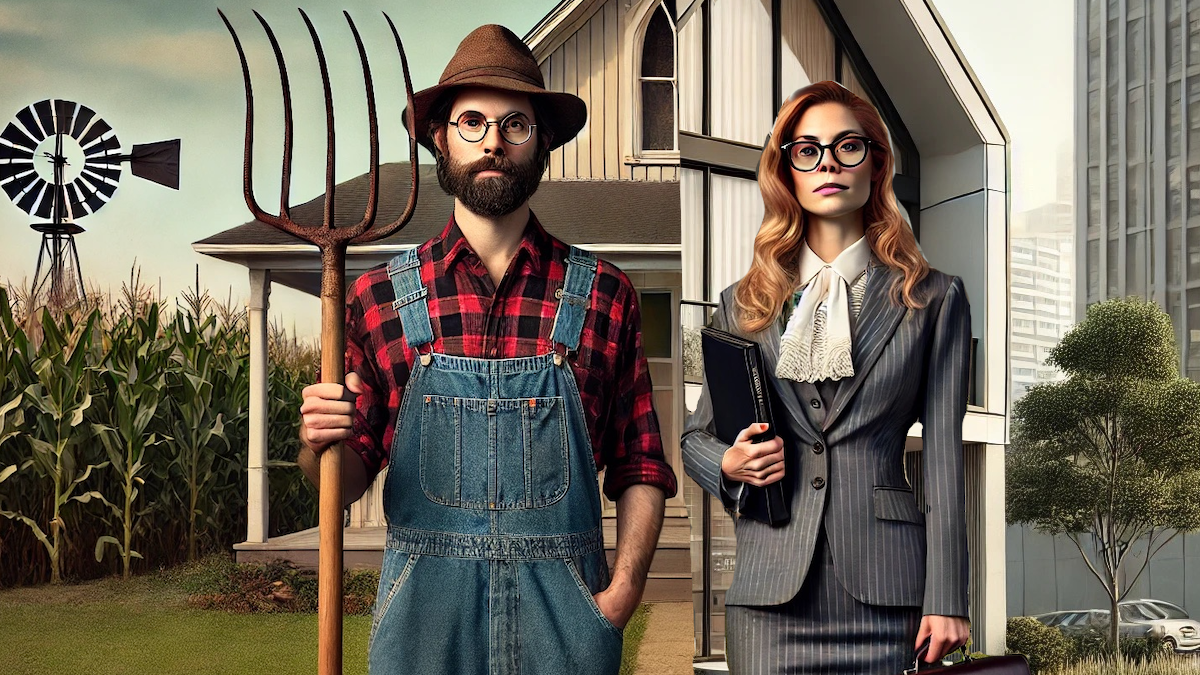
The United Cities and Ruralities of America
It's a two-state solution for our own intractable conflict.
As Abraham Lincoln put it in his famous speech quoting the biblical aphorism, America is a house divided against itself. We're not one united country, but two very different nations penned up within the same borders.
Worse yet, those two nations are at each other's throats. We have drastically different politics and philosophies. We're mutually suspicious, resentful and hostile. Our political divide has grown into a chasm pitting state against state, household against household, family against family.
It's no wonder our national mood is so angry, bitter and bleak. We can't endure like this forever. Is there a way out? Do we need a peaceful national divorce?
The last time America was this balkanized was in the lead-up to the Civil War. In that case, the separation was more or less geographical, between the free industrialized states of the North and the slaveholding agricultural states of the South.
Some have suggested a similar split today, but instead of North and South, it's blue states seceding from red states (or vice versa), creating two nations, each with their own politics. But this won't work because, unlike the Civil War era, our national enmity can't be divided along such neat lines.
The line of demarcation isn't between states, but between urban and rural areas within each state. Every large state has liberal cities and a conservative countryside. This is true in deep-blue states like New York and California and blood-red states like Texas. The only thing that differentiates the states is which region dominates its overall politics. Even then, the "domination" is more often 52-48 than 90-10.
You can debate why the urban-rural pattern holds so consistently. One theory is that cities attract a multicultural population. This gives urban residents firsthand experience of diverse cultures and beliefs, making them more cosmopolitan, tolerant and broad-minded, as opposed to isolated and insular areas that tend to be suspicious of outsiders and resistant to change.
Another explanation is that cities are where the high-paying jobs are. This makes them the home of well-educated, upwardly mobile people who can afford to be generous and aren't threatened by change. Meanwhile, in the Rust Belt where factories are closing and populations are shrinking, resentful locals are drawn to politicians who make impossible promises about turning back the clock.
Whatever explanation you prefer, the urban-rural divide seems destined to be a feature of our politics for the foreseeable future. If we don't change something, every election is going to be increasingly apocalyptic, as both sides wrestle to pull the nation onto trajectories that diverge more and more widely with each passing year.
Here's my modest proposal.
Take, say, the five largest metro areas in each state. They would become a new sovereign entity—a coalition of cities like the medieval Hanseatic League or the Décapole. The rest of the state would be a separate sovereign entity. Both of these new polities would have the power of self-governance over their own territory and their own residents.
Each of these new entities would then elect representatives at the national level. We'd have not one, but two Congresses. Urban America would elect one, and rural America another. Each region could enact its own laws, governing itself as its inhabitants see fit.
The cities could ban guns, and the rural areas could ban abortion. The cities could welcome immigrants, and the rural areas could bar the doors against them. The cities could enact socialized health care, and the rural areas could privatize everything. We'd effectively become two Americas, but nested within each other. It's the cleanest way to carve our politics at the joints.
It's similar to the devolved government of Northern Ireland, keeping power as local as possible, or the long-proposed two-state solution in Israel/Palestine. The only immutable right that both regions would have to respect would be the right to free travel.
Even with this arrangement, we'd still be tied to each other by links of economic interdependence. The rural areas, by definition, would produce most of the food and natural resources. Meanwhile, the cities would have the most people, the most economic power, and the prosperous industries like tech that benefit from concentrated talent pools.
This wouldn't resolve every political problem. Just like any other neighboring nations, Urban America and Rural America would have to hammer out cross-border agreements on taxation and trade, so that neither became a tax haven at the other's expense. The question of funding for inherently collective priorities, like national defense or environmental protection or infrastructure, would undoubtedly be a source of fierce debates. There would have to be procedures for what happens if a municipality wants to leave one polity and join the other.
But this would cut the knot of some of the most contentious and intractable issues in our present politics. Everyone would have a greatly improved chance to live in the kind of society they prefer.
Best of all, we'd have a true test of which of these governing philosophies works better in the real world. Right now, each side in our politics claims credit for national successes while blaming failures on the other. These debates cloud the answer to which politics is truly better for the people who live with it.
A clean separation would cut through this haze of confusion. If one of these new entities—call them the United Cities of America and the United Ruralities of America—thrives and prospers, while the other declines, it would be undeniable proof of which way is the better way to live.
